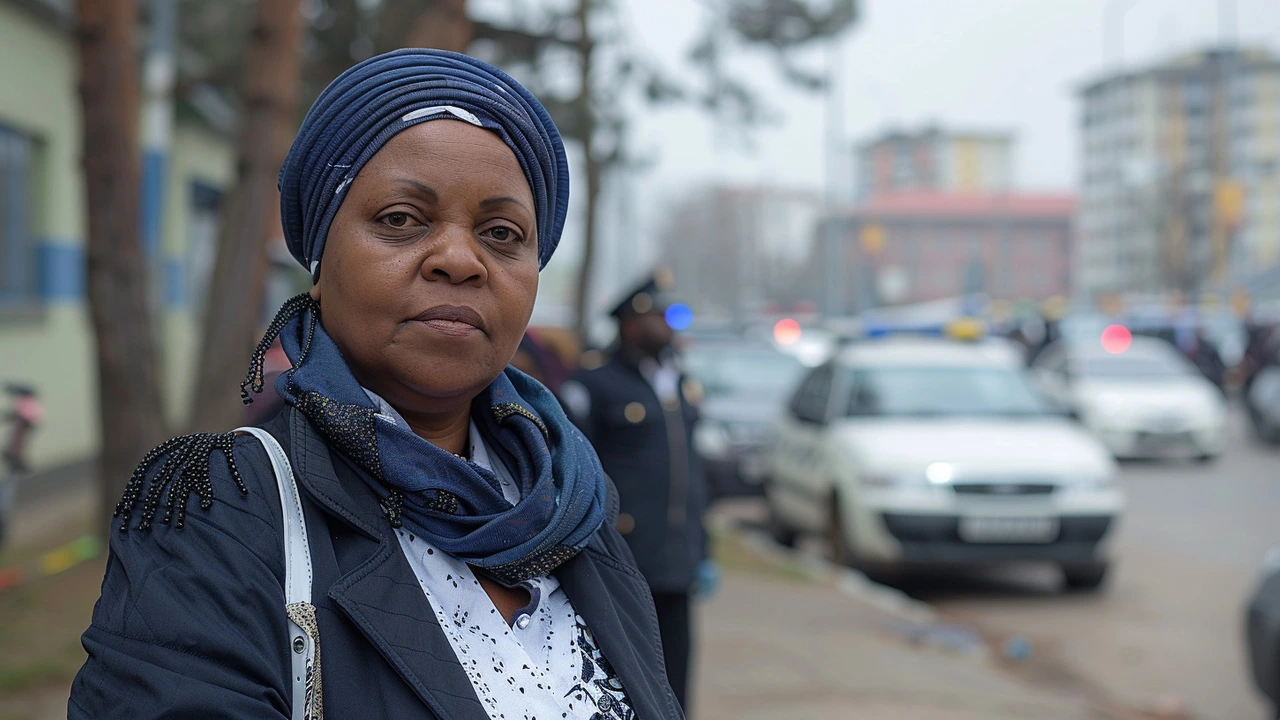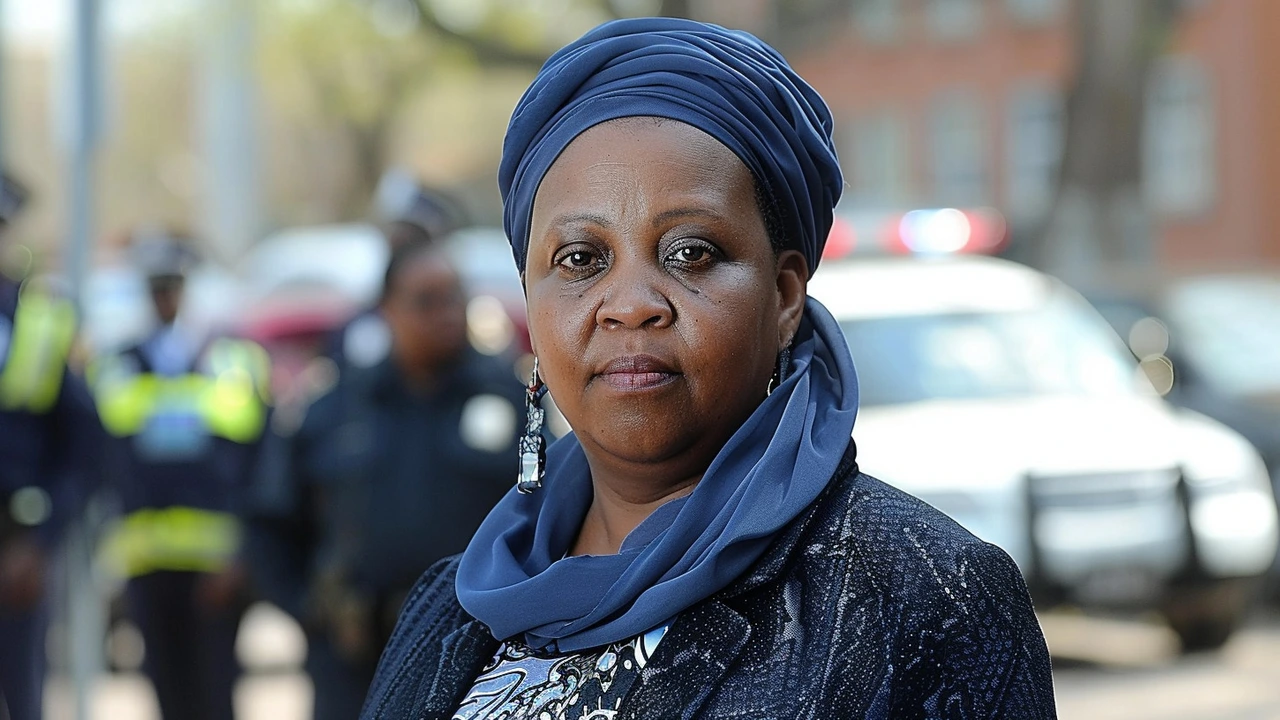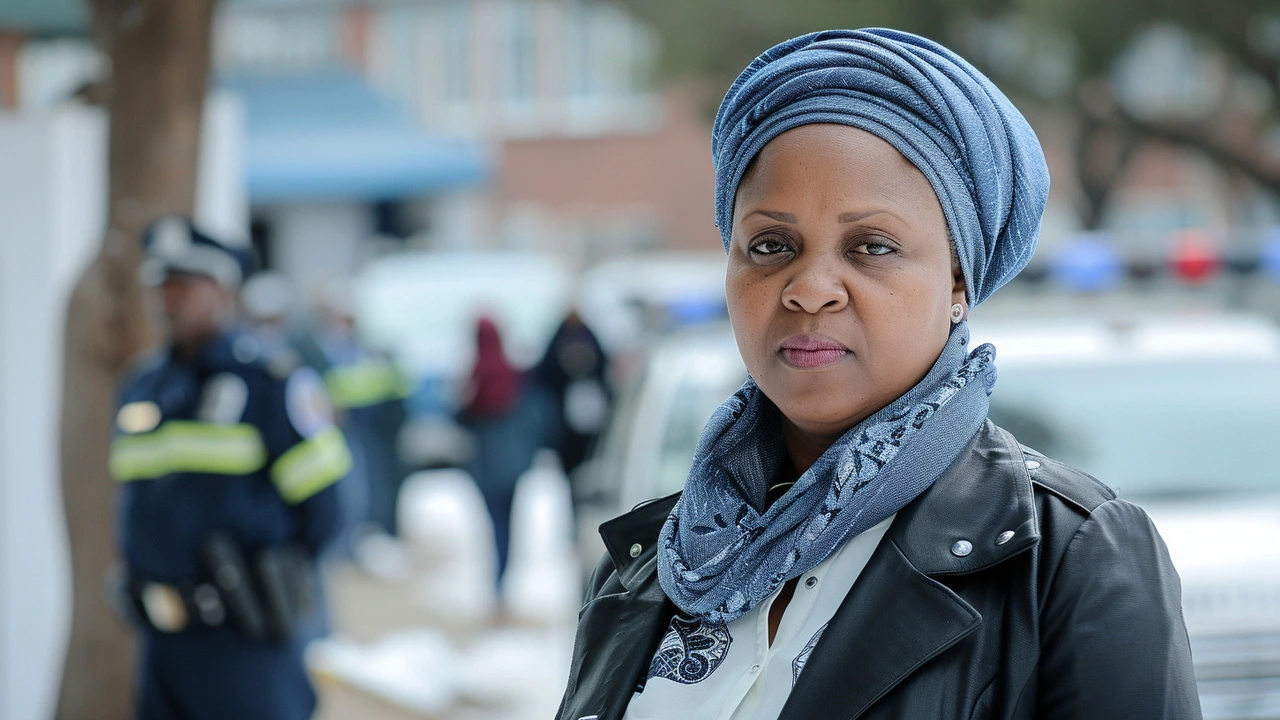Dudu Myeni, the former chairperson of South African Airways (SAA), has passed away, leaving behind a complex legacy intertwined with corruption allegations and high-profile legal battles. Announced by the Jacob Zuma Foundation on a quiet Saturday afternoon, Myeni's death came not long after a period of hospitalization, casting a somber shadow over South Africa’s political and legal landscape.
Myeni's tenure at SAA was marked by turbulence and controversy. She served as the chairperson during a critical time for the national airline, attempting to steer it through financial difficulties and labor disputes. Despite these challenges, her time in the spotlight was often overshadowed by allegations of misconduct and corruption. Most notably, Myeni faced severe scrutiny in connection with the Bosasa scandal, a name that sends chills down the collective spine of South African governance.
The Jacob Zuma Foundation’s announcement confirmed that Myeni had been battling health issues that led to her recent hospitalization. However, these personal struggles did not divert attention from the legal storm surrounding her. She had been facing corruption and fraud charges tied to Bosasa, a company infamous for its role in widespread state capture allegations. Specifically, Myeni was accused of receiving significant gratifications from Bosasa's subsidiary, Sondolo IT, a company managed by Trevor Mathenjwa. The allegations painted a picture of lavish benefits, including security upgrades worth R200,000 for her residence in Richards Bay and additional hotel accommodations and travel expenses totaling over R107,000, which allegedly extended to her close associates.
These accusations were part of a broader investigation into state corruption, which has become a contentious and high-stakes issue in South Africa. Dudu Myeni, who once served as chairperson of SAA, was at the center of a storm that symbolized deeper issues within state enterprises and governance. She was out on a R10,000 bail when these allegations came to light, highlighting the ongoing tension between her personal defense and public condemnation.
The Johannesburg High Court had been grappling with her case, eventually deciding to postpone proceedings to November 21 to accommodate her hospitalization. This judicial decision provided a temporary reprieve but did little to quell the growing speculation and public interest in the outcome of her trials.
Implications of Her Death
Myeni's passing has left a void in the ongoing narrative of corruption within state enterprises. Her death raises significant questions about the residual impacts of her alleged actions and the broader implications for South Africa's fight against corruption. Will her passing lead to the closing of her case, or will the authorities pursue justice posthumously? These are critical questions that remain unanswered at this time.
The Jacob Zuma Foundation, in its announcement, requested privacy for Myeni’s family, urging the media and the public to respect their grief. In times of profound loss, such a call for privacy is understandable, yet the public's demand for transparency and accountability remains strong.
Public Reactions
The response to Myeni’s death has been polarized. On one hand, there are expressions of sympathy and condolences from those who saw her as a scapegoat in a larger game of political maneuvering. On the other hand, there remains a steadfast call for accountability from activists and ordinary citizens who endured the fallout from her alleged corruption.
Social media platforms have become a battleground of opinions. Many have taken to Twitter and Facebook to express their thoughts and feelings. Some users highlight her contributions and struggles, while others underscore the need for justice and the fight against corruption. This duality of narratives reflects the broader societal divisions when it comes to issues of state capture and governance in South Africa.

Legacy and Lessons
As the nation grapples with the news of Myeni's death, it is imperative to reflect on the lessons learned from her tenure and the subsequent investigations. Dudu Myeni's story is a stark reminder of the complexities and challenges inherent in public service. Her journey—from a high-ranking official to a figure embroiled in scandal—serves as a cautionary tale about the consequences of alleged misconduct.
The Bosasa scandal, central to Myeni’s legal battles, has been a critical focal point in South Africa's efforts to address systemic corruption. The allegations against Bosasa, spanning various high-profile figures and substantial financial misdeeds, have spurred broader conversations about transparency, accountability, and the need for robust oversight mechanisms in all levels of government.

Looking Forward
In the wake of Dudu Myeni's death, South Africa stands at a crossroads. The ongoing fight against corruption remains a priority, with many seeing her passing as a significant moment in this broader narrative. Authorities and legal institutions are now faced with the task of addressing the unfinished business surrounding her case and ensuring that her passing does not deter the pursuit of justice.
This moment also offers an opportunity for introspection within governmental and public institutions. Strengthening transparency, accountability, and integrity in public service should be paramount. The lessons drawn from Myeni’s life and legal troubles could serve as catalysts for substantive change, driving efforts to prevent similar scenarios in the future.
For now, the focus remains on Myeni’s family as they navigate their period of mourning. As South Africa reflects on her life and the complex legacy she leaves behind, it is a reminder of the multifaceted nature of public service and the profound impacts of corruption on a nation's socio-political fabric.


John Crulz
June 17, 2024 AT 00:03It's striking how Dudu Myeni's tenure encapsulates both the challenges of managing a state airline and the pitfalls of political patronage. The Bosasa allegations threw a shadow over the airline's already fragile finances, and the legal battles only deepened public distrust. While some argue she was a scapegoat for broader systemic issues, the court documents reveal a pattern of questionable decisions. Ultimately, her death adds a somber footnote to an already tangled saga.
Anita Drake
June 24, 2024 AT 09:56Reading about her passing reminds us that behind every headline there’s a family grieving a loss. The Jacob Zuma Foundation’s request for privacy is a humane plea we should honor, even as we demand accountability. It's a delicate balance between compassion for loved ones and the public’s right to transparency.
Eduardo Lopez
July 1, 2024 AT 19:48The legacy of Dudu Myeni is a textbook case of how power can corrupt even the most public of institutions. Her involvement with Bosasa wasn’t just a minor slip-it was a full‑blown assault on the integrity of our state assets. One can’t help but shudder at the idea that a single chairperson could wield such influence over national resources.
Nancy Perez de Lezama
July 9, 2024 AT 05:41Her case will linger in the courts.
Matt Heitz
July 16, 2024 AT 15:34The saga of Dudu Myeni reads like a cautionary chronicle for any aspiring public servant who believes that political connections can eclipse legal boundaries. From the moment she assumed the chair of South African Airways, she was thrust into a maelstrom of financial distress, labor unrest, and relentless media scrutiny. Yet, the most damning layer of that maelstrom was the intricate web of alleged kickbacks and preferential treatment tied to Bosasa, a corporate entity that has become synonymous with state capture. The prosecution’s dossier cites concrete instances of inflated security contracts, dubious hotel reimbursements, and suspicious travel expenses that collectively amount to a breach of fiduciary duty. Moreover, the fact that those benefits allegedly extended to her close associates underscores a pattern of nepotistic enrichment rather than isolated missteps. Legal scholars have pointed out that the R200,000 security upgrade at her Richards Bay residence is not simply a personal expense but a manifestation of state resources being siphoned for private gain. When the High Court postponed her hearing to accommodate hospitalization, it inadvertently highlighted the tension between humanitarian considerations and the relentless pursuit of justice. Critics argue that postponements in high‑profile corruption cases risk eroding public confidence in the judicial process, especially when the accused occupies a prominent political foothold. Supporters, however, maintain that due process must remain sacrosanct, regardless of the surrounding political tumult. The broader implication of her death is that the state must decide whether to close the file out of respect for the deceased or to press forward to ensure that the precedent of impunity is not reinforced. In many jurisdictions, the death of an accused does not automatically extinguish the state’s right to seek restitution or to lay the groundwork for civil recovery. South Africa’s own legal framework provides mechanisms to continue investigations post‑mortem, particularly when the alleged crimes have far‑reaching economic repercussions. If the authorities elect to terminate the case, it could send a chilling signal to future officials that the specter of prosecution can be sidestepped by mortality. Conversely, persisting with the case-perhaps through a successor in the legal proceedings-would reaffirm the nation’s commitment to rooting out corruption at every level. Ultimately, whether the courts chose to march on or to bow out, the narrative of Dudu Myuni’s rise and fall will remain an indelible lesson on the perils of unchecked authority within state enterprises.
Susan Mark
July 24, 2024 AT 01:27While the legal intricacies are indeed complex, it’s worth noting that the systemic issues at SAA predate Myeni’s chairmanship, suggesting that institutional rot requires broader reforms beyond an individual’s fate.
Jason Jennings
July 31, 2024 AT 11:20Honestly, the focus on her personal perks distracts from the fact that the airline was hemorrhaging cash for years, and no amount of security upgrades could fix that underlying mismanagement.
Diego Vargas
August 7, 2024 AT 21:13I think the court paperwork shows a pretty clear pattern of misuse of funds, even if some papers are missing or redacted. The Bosasa ties are especially incriminating, and they raise questions about how many other deals were hidden from public view.
Alex Lee
August 15, 2024 AT 07:06She got what she deserved. Corruption never pays.
Vida Yamini
August 22, 2024 AT 16:59One thing that stands out in this whole situation is the human element behind the headlines we see every day It’s easy to forget that there are families and friends dealing with loss while the public debates accountability At the same time we must keep pushing for transparency because that’s how trust is rebuilt In my view the best way forward is to use this moment as a catalyst for deeper reforms within state‑run entities I encourage anyone reading this to consider how we can collectively demand better oversight and stronger ethical standards Let’s not let the tragedy be in vain but rather a stepping stone toward lasting change
James Lawyer
August 30, 2024 AT 02:52Respecting the family’s privacy aligns with the principle of dignity, yet the state’s obligation to disclose procedural developments remains unaffected; both considerations can coexist without conflict.
Abby Culbertson
September 6, 2024 AT 12:45i cant believe how messed up the whole thing turned out. its just sad for everyone involved.
Awolumate Muhammed Abayomi
September 13, 2024 AT 22:38Wow this is a big moment for the country we need to learn from this and make sure future leaders dont repeat the same mistakes. The whole thing shows how important strong oversight is!
Josh Tate
September 21, 2024 AT 08:31I totally agree, we gotta keep the pressure on for better governance. It's a collective effort.
John Smith
September 28, 2024 AT 18:24The legal precedent set by Myeni's case will likely influence future state capture investigations, especially regarding asset misappropriation and personal enrichment schemes.
Alex Soete
October 6, 2024 AT 04:17Exactly! Let’s turn this into a rallying cry for reform and hold every official accountable.
Cara McKinzie
October 13, 2024 AT 14:10Honestly, this story is just another soap opera that the media loves to spin. All the drama feels manufactured and the real victims get ignored.
Joseph Conlon
October 21, 2024 AT 00:03While the focus on Myeni’s personal benefits is certainly eye‑catching, it’s a bit reductionist to claim that her perks were the sole cause of SAA’s financial woes. The airline had been plagued by legacy debt, poor strategic decisions, and a volatile market long before she stepped into the chair. One could argue that the real lesson here is the need for systemic restructuring rather than singling out any one individual as the villain. By broadening the conversation we can avoid the trap of scapegoating and instead target the underlying operational failures that have persisted for years.